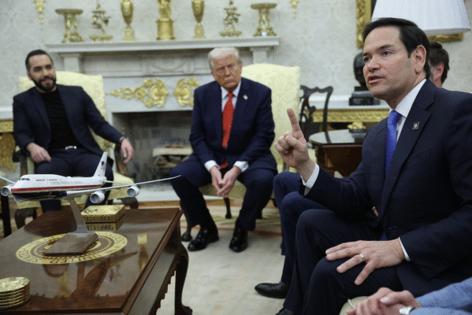Noah Feldman: Supreme Court's strategy for dealing with the White House emerges
Published in Op Eds
The Supreme Court’s strategy for dealing with President Donald Trump’s illegal executive actions is gradually revealing itself: carefully uphold the rule of law while seeking to avoid direct confrontation.
In a cautious, compromise-based 9-0 decision, the justices upheld a federal district court order directing the Trump administration to “facilitate” the return of a Salvadoran immigrant mistakenly deported to a prison in El Salvador. At the same time, the Supreme Court told the lower court to show “due regard for the deference owed to the executive branch in the conduct of foreign affairs.”
The case of Kilmar Armando Abrego Garcia is different from those of the 260 Venezuelans deported with him for alleged membership in the gang Tren De Aragua.
To be sure, all the deportations are of doubtful legality. District Court Judge James Boasberg ordered the deportation flights to halt, but the Trump administration flew the planes anyway, claiming the order didn’t come in time.
But unlike the other deportees, who are challenging the general legal basis for their detention, Abrego Garcia was subject to a 2019 order by an immigration judge that said he could not be deported to El Salvador because he would face persecution. The administration admits this and says Abrego Garcia’s arrest and deportation resulted from an “administrative error.”
It’s obviously outrageous that the Trump administration hasn’t already sought Abrego Gracia’s return from a Salvadoran prison. Its motivation for refusing to do so hasn’t been clearly stated, but it presumably is based on an unwillingness to publicly reverse one deportation lest it show that all of them could eventually be reversed under court order. The administration’s legal argument boils down to the claim that a court can’t tell it to bring Abrego Garcia back because he is now outside the U.S.
The Supreme Court could have simply rejected that claim. Justice Sonia Sotomayor, writing a separate concurring opinion on behalf of the court’s three liberals, urged precisely that, calling it “plainly wrong.” What’s more, she added, the administration’s argument “implies that it could deport and incarcerate any person, including U.S. citizens, without legal consequence, so long as it does so before a court can intervene.”
The fact that all of the justices, including the arch-conservatives, upheld the essence of the lower court’s order strongly indicates that they don’t think the Trump administration has a legal leg to stand in this case. Otherwise, one or more of them could have dissented.
Yet the conservatives apparently did not want to encourage a direct confrontation between the courts and Trump. By drawing a subtle distinction between the lower court’s order to “facilitate” Abrego Garcia’s return (which they upheld) and its order to “effectuate” it (which they asked to be clarified), they were intentionally encouraging the lower court to tread lightly and not directly order the return. And they were specifically hinting that too direct an order telling Trump what to say to the Salvadoran government might interfere with the president’s power to control foreign relations.
Of course, the key danger associated with such a direct order is that the Trump administration might not obey it. And if Trump defies a direct court order, that could trigger a constitutional crisis in the form of a showdown between the courts and the executive branch.
If that happens, I predict the court will not back down. But it doesn’t want that crisis to occur at all because the outcome is uncertain. Ultimately, the court can only expect people to obey its orders because they are the law. Trump could simply refuse.
And if the crisis over a defied court order is going to happen in some way, the justices would definitely be wise to make sure it doesn’t happen over a person detained abroad. The court would be at its weakest point of power in a case involving foreign affairs, which the Constitution assigns to the executive and allows Congress to influence.
In a case involving U.S.-based actors, the court could order compliance despite a presidential directive to the contrary — and American officials sworn to uphold the law might obey. In contrast, the court cannot order anyone in El Salvador to do anything.
The upshot is that the justices are treading carefully. The rule of law must be upheld. How and when that happens is crucial to ensuring that the law wins and Trump loses. Prudence is the name of the game — as it should be.
_____
This column reflects the personal views of the author and does not necessarily reflect the opinion of the editorial board or Bloomberg LP and its owners.
Noah Feldman is a Bloomberg Opinion columnist. A professor of law at Harvard University, he is author, most recently, of “To Be a Jew Today: A New Guide to God, Israel, and the Jewish People."
_____
©2025 Bloomberg L.P. Visit bloomberg.com/opinion. Distributed by Tribune Content Agency, LLC.




























































Comments